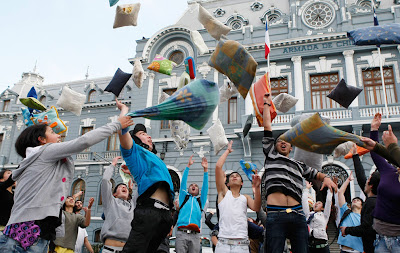Canadian civil society welcomes RCMP raid on Blackfire Exploration's offices
Council of Canadians
August 29, 2011
MiningWatch Canada, Common Frontiers, the United Steelworkers (USW), and Council of Canadians welcome news of an RCMP raid on the Calgary office of Blackfire Exploration, the privately-held company whose barite mine in Chiapas, Mexico has been in the news since the November 2009 murder of anti-mining activist Mariano Abarca.
The Globe and Mail reports that the RCMP raided Blackfire’s offices on July 20, 2011, alleging that Blackfire “illegally paid local mayor, Julio César Velazquez Calderón about $19,300 (CDN) ‘to keep the peace and prevent local members of the community from taking up arms against the mine.’”
“It’s encouraging that Blackfire’s operations are being investigated under the Corruption of Foreign Public Officials Act,” says Jamie Kneen, Communications Coordinator for MiningWatch Canada. “It’s really the only law that holds Canadian companies accountable for their activities outside the country. We hope that it will bring about some justice in this case.
“If a case this egregious can’t be successfully prosecuted there’s little hope for accountability in the myriad of other cases we are hearing complaints about.”
Following Abarca’s murder, and at the request of the Mexican Network of Communities Affected by Mining, MiningWatch, Common Frontiers, and USW organized a fact-finding delegation to Chiapas. The delegation’s findings brought serious social and environmental impacts of the mine to public attention and led to the request for a bribery investigation, sponsored by nine organizations including the Council of Canadians.
“The RCMP investigation is a positive development, but it’s also just the tip of the iceberg,” says Rick Arnold, former coordinator of Common Frontiers, who accompanied the delegation. “Local residents with whom we spoke held Blackfire responsible for the murder of Mariano Abarca, which also has yet to be fully investigated."

Following the shooting of Abarca in front of his home on November 27, 2009, three past company employees were jailed, but they still await court appearance relating to this murder.
Despite company claims that it practices environmentally responsible mining, the delegation also found no indication of any environmental mitigation at the mine site, which remains suspended since December 2009. The company initiated legal action in the Chiapas court system to try to overturn the decision of the Chiapas Ministry of Environment and Housing (SEMAVI) to suspend the mine.
“Blackfire should leave Chiapas, once and for all, and issue a public apology to local communities,” said Mark Rowlinson, Legal Counsel for the United Steelworkers who also participated in the delegation. “We saw first hand the human and environmental impact of the company's presence in Chicomuselo. The costs to the community have already been too great.”
José Luis Abarca Montejo, son of Mariano Abarca, who has taken a leadership role in his community since his father was killed, made a visit to Canada in September 2010, when he supported calls for stronger legislation to regulate Canadian mining companies overseas. “ I think the government of Canada should be more careful with these companies who come to Mexico and treat us badly,” Abarca said to Embassy Magazine in Ottawa. “I call on the Canadian government to do something because we’re the same as any other citizens. We have rights too.”
 Joan Hinton
Joan Hinton










































